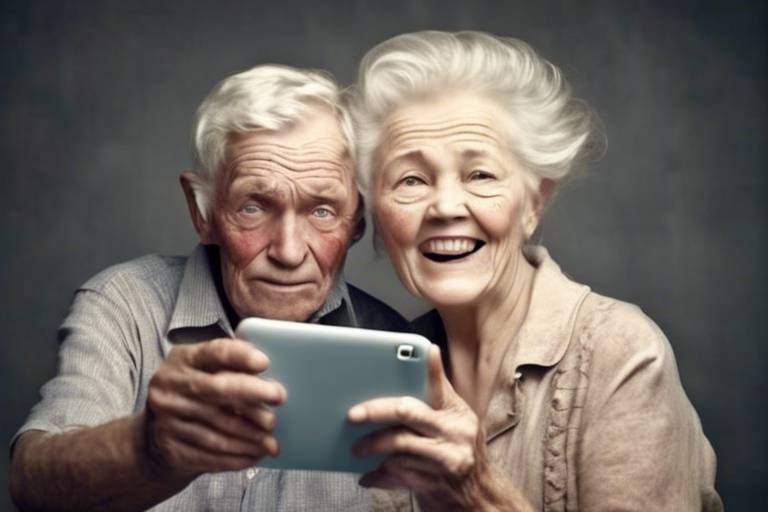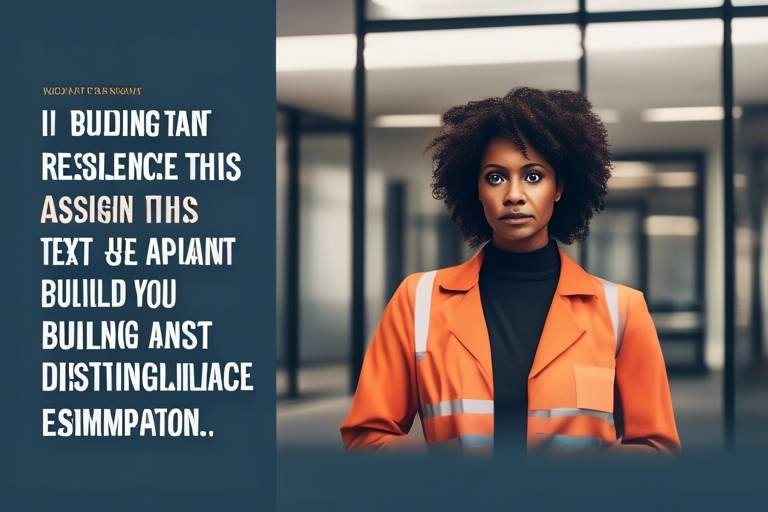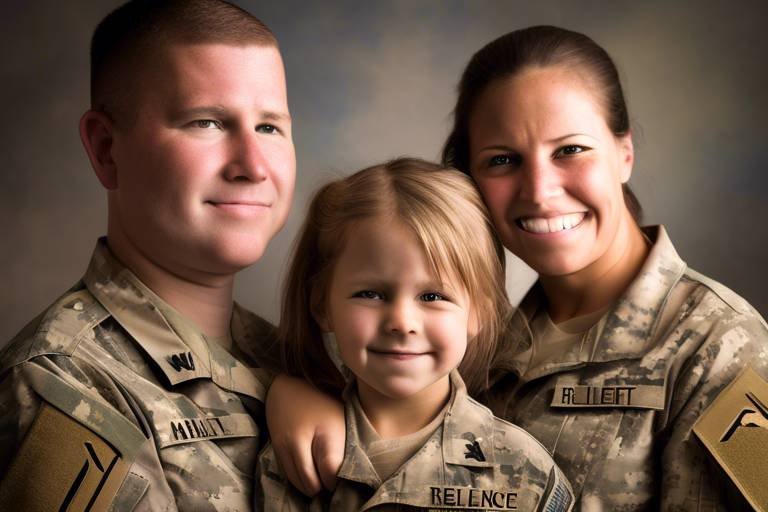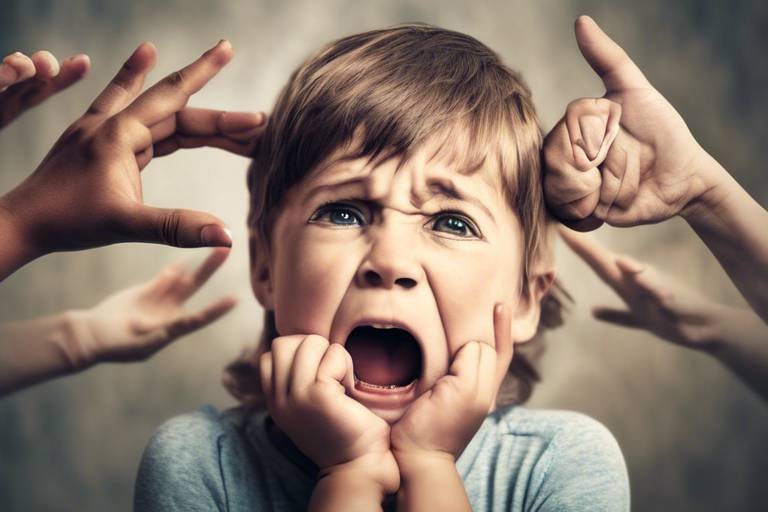Can Old Age Affect Your Confidence?
As we journey through life, the question of whether aging impacts our confidence often arises. This is not just a matter of vanity; it touches on our very sense of self-worth and how we perceive our place in the world. Aging can bring about a myriad of changes—some expected and some surprising. From the physical transformations that come with time to the societal perceptions that shape our identity, each factor plays a crucial role in influencing our confidence levels as we age.
Imagine waking up one day and noticing that your reflection in the mirror no longer resembles the vibrant person you once knew. This realization can be jarring. Our physical appearance is often intertwined with our self-esteem, and as we age, changes such as wrinkles, gray hair, and shifts in body shape can lead to feelings of inadequacy. Moreover, decreased mobility or health issues may further complicate this relationship, making us question our capabilities and worth. It’s essential to recognize that these changes are a natural part of life, yet they can significantly impact how we see ourselves.
On top of physical changes, societal perceptions play a pivotal role in shaping our confidence. Unfortunately, society often harbors negative stereotypes about aging. Older individuals may feel marginalized or underestimated, which can lead to a diminished sense of self. The media, in particular, has a powerful influence on how we perceive aging. Whether it’s through movies, advertisements, or news stories, the portrayal of older adults can either uplift or undermine their confidence. This brings us to an important point: how are older adults represented in the media, and what effects do these representations have on their self-image?
In the world of media, there exists a stark contrast between positive and negative depictions of aging. On one hand, we have inspiring examples of older adults who lead fulfilling lives, breaking stereotypes and showcasing resilience. On the other hand, there are portrayals that reinforce negative stereotypes, depicting older individuals as frail or out of touch. This duality can create confusion and impact how older adults view themselves. It’s crucial to understand that while media representation can be a double-edged sword, the presence of positive role models can significantly enhance self-esteem among older adults. These role models serve as a beacon of hope, showing that confidence and vitality do not diminish with age.
Ageism, a form of discrimination based on age, can also wreak havoc on an older person's confidence. When society dismisses or devalues individuals simply because of their age, it can lead to feelings of inadequacy. This discrimination can manifest in various ways, from subtle biases in the workplace to overt exclusion from social circles. Such experiences can chip away at one’s self-esteem, making it vital for older adults to find ways to counteract these negative influences. Building a supportive community and fostering meaningful relationships can be incredibly empowering, allowing older individuals to reclaim their confidence.
As we delve deeper into the psychological aspects of aging, it becomes clear that mental health is intricately linked to self-confidence. Issues such as anxiety and depression can take a toll on how we perceive ourselves. However, it’s important to remember that resilience plays a key role in navigating these challenges. Resilience is like a muscle—the more we use it, the stronger it gets. Older adults can cultivate resilience by embracing challenges, seeking support, and focusing on personal growth. By doing so, they can bolster their confidence and face the aging process with grace and dignity.
Social support networks are instrumental in maintaining confidence as we age. Friendships and community connections provide a sense of belonging and validation, which are crucial for older adults. Whether it’s participating in community activities, joining clubs, or simply spending time with loved ones, these interactions can foster a positive self-image. Remember, confidence is not merely an internal state; it thrives in the context of our relationships with others. By nurturing these connections, older individuals can enhance their self-esteem and embrace the beauty of aging.
- Does aging automatically lead to a loss of confidence? Not necessarily. While some may experience a decline in confidence due to physical or societal changes, others may find strength and resilience in their experiences.
- How can older adults improve their confidence? Engaging in social activities, seeking support from friends and family, and challenging negative stereotypes can help improve self-esteem.
- What role does media play in shaping perceptions of aging? Media representation can significantly influence how older adults view themselves. Positive portrayals can inspire confidence, while negative ones can diminish it.
- Is it possible to build resilience as we age? Absolutely! Resilience can be developed through practice, by embracing challenges, and by maintaining a positive outlook on life.

The Impact of Physical Changes
As we journey through life, one undeniable truth is that our bodies undergo a myriad of changes, especially as we age. These physical transformations can be both subtle and pronounced, and they often play a significant role in shaping our self-esteem and confidence levels. Imagine waking up one day and noticing that your once-vibrant skin has lost its youthful glow, or that simple tasks like climbing stairs have become a bit more challenging. It's not just about the changes themselves; it's how we perceive these changes that can make all the difference.
Physical changes can manifest in various ways, including:
- Alterations in Appearance: Wrinkles, gray hair, and changes in body composition can lead to feelings of insecurity. Many individuals may feel that they no longer fit society's standards of beauty, which can lead to diminished self-worth.
- Mobility Issues: With aging, many people experience a decline in mobility, which can be frustrating. The inability to engage in physical activities can lead to a sense of loss, impacting one's confidence in social situations.
- Health Challenges: Chronic illnesses or health conditions can create a cloud of uncertainty and anxiety. When our bodies don't function as they used to, it can be hard to maintain a positive self-image.
These changes can create a ripple effect on an individual's confidence. For instance, when someone feels less attractive due to physical changes, they might withdraw from social events, leading to isolation. This isolation can further exacerbate feelings of inadequacy, creating a cycle that’s tough to break. It's essential to recognize that while these changes are natural, they don't define our worth.
Moreover, the societal pressure to maintain a youthful appearance can intensify these feelings. We live in a culture that often celebrates youth and beauty, leaving many older adults feeling sidelined. This societal lens can distort how we view ourselves, causing a disconnect between our internal self-perception and external realities.
However, it's crucial to remember that confidence is not solely rooted in physical appearance. Many older adults find that their wisdom, experience, and unique perspectives become sources of strength. Embracing these aspects can lead to a more profound sense of self-worth, independent of physical changes. As we age, it becomes increasingly important to focus on holistic well-being, which includes mental, emotional, and social health.
In conclusion, while physical changes are an inevitable part of aging, they do not have to dictate our confidence levels. By fostering a positive self-image and seeking support from loved ones, older adults can navigate these changes with grace and resilience. After all, confidence comes from within, and it's never too late to embrace the beauty of who you are, regardless of age.

Societal Perceptions of Aging
As we journey through life, we inevitably encounter the complex tapestry of societal perceptions surrounding aging. These perceptions can significantly shape how we view ourselves and our confidence as we grow older. Often, society paints a rather bleak picture of aging, associating it with decline, frailty, and irrelevance. This narrative can seep into the minds of older adults, creating a sense of inadequacy that can be hard to shake off. But why is this societal view so prevalent?
One of the primary reasons is the way aging is portrayed in popular culture. Many movies and television shows tend to depict older characters as grumpy, forgetful, or out of touch with the modern world. This not only reinforces negative stereotypes but also creates a self-fulfilling prophecy where older individuals start to see themselves through this narrow lens. In contrast, when older adults are shown as vibrant, wise, and capable, it can uplift not only their self-image but also the perceptions held by younger generations.
Additionally, societal attitudes towards aging can lead to a form of internalized ageism, where older adults begin to believe the negative stereotypes that society imposes on them. This can manifest in various ways, such as avoiding social situations, feeling unworthy of new opportunities, or even neglecting their health. It’s crucial to challenge these perceptions, as they can have a profound impact on an individual’s self-esteem and overall quality of life.
To illustrate this point, consider the following table that highlights common stereotypes about aging and their potential effects on self-confidence:
| Stereotype | Effect on Self-Confidence |
|---|---|
| Older adults are less capable | Feelings of inadequacy and reluctance to engage in new activities |
| Age equals decline | Increased anxiety about health and well-being |
| Older people are out of touch | Isolation and withdrawal from social interactions |
However, it’s not all doom and gloom. There are numerous initiatives and movements aimed at changing the narrative around aging. Organizations are working tirelessly to promote positive images of aging that celebrate the contributions and capabilities of older adults. By showcasing stories of resilience, wisdom, and vitality, these movements aim to shift societal perceptions and empower older individuals to embrace their age with confidence.
Ultimately, the societal perceptions of aging can either build up or tear down an individual's confidence. It’s essential for both older adults and society at large to actively challenge negative stereotypes and foster an environment where aging is viewed as a natural and enriching part of life. By doing so, we can create a world where everyone, regardless of age, feels valued and capable.

Media Representation
Media representation plays a pivotal role in shaping how society views older adults, and consequently, how they view themselves. When you flip through channels or scroll through social media, what do you see? Often, older individuals are portrayed in a narrow scope—either as frail, forgetful, and dependent, or as vibrant, wise, and full of life. This duality in representation can create conflicting feelings among seniors regarding their own self-worth and confidence.
For instance, consider the popular trope of the "grumpy old man" or the "sweet old lady" that often pops up in sitcoms and movies. These characters can reinforce stereotypes that may not accurately reflect the diverse experiences and capabilities of older adults. When the media consistently depicts aging in a negative light, it can lead to internalized ageism, where older individuals start to believe these stereotypes about themselves. This is not just an issue of representation; it's about identity and how one sees themselves in the broader context of society.
On the flip side, positive portrayals can have a refreshing impact. Shows and films that highlight older adults as dynamic, capable, and adventurous can inspire confidence and encourage viewers to embrace their age. For example, consider movies that feature older protagonists embarking on exciting journeys or achieving personal growth. Such narratives can serve as a powerful reminder that age is just a number and that life can be fulfilling at any stage.
Moreover, the presence of role models in media can significantly influence older adults' self-perception. When seniors see characters or real-life figures who are thriving in their later years, it can ignite a sense of possibility. They may think, "If they can do it, so can I!" This sense of connection and inspiration can be a game-changer for confidence levels.
To illustrate the impact of media representation, let’s take a look at a simple table summarizing various media portrayals and their potential effects on older adults:
| Media Portrayal | Potential Effect on Confidence |
|---|---|
| Negative Stereotypes | Lowered self-esteem, feelings of inadequacy |
| Positive Role Models | Increased confidence, motivation to embrace aging |
| Neutral Representations | Indifference towards self-image |
Ultimately, media representation is a double-edged sword. It can either uplift or undermine the confidence of older adults. As consumers of media, we have the power to advocate for more diverse and realistic portrayals of aging. By supporting content that celebrates the richness of life at every age, we can contribute to a cultural shift that fosters self-acceptance and confidence among seniors. So, the next time you watch a show or read an article, ask yourself: Is this representation empowering or limiting? Your perspective could help shape the narrative for generations to come.

Positive vs. Negative Depictions
When it comes to the representation of older adults in media, the spectrum of portrayals is vast and varied. On one side, we have positive depictions, which often showcase seniors as vibrant, active, and wise individuals who continue to contribute meaningfully to society. These representations can significantly enhance the self-esteem of older adults, as they see reflections of themselves that are both uplifting and empowering. For instance, characters in films or shows who embody strength, independence, and joy can inspire older viewers to embrace their age with confidence and pride.
Conversely, negative depictions tend to paint a rather bleak picture, often portraying older adults as frail, forgetful, or out of touch with modern life. Such stereotypes can be damaging, leading to a sense of inadequacy among older individuals who may internalize these negative images. This can create a vicious cycle where the media's portrayal influences societal attitudes, which in turn affects how older adults perceive themselves. The impact of these negative images can be profound, as they may contribute to feelings of isolation and decreased self-worth.
To illustrate the contrast between these two types of depictions, consider the following table:
| Type of Depiction | Characteristics | Effects on Self-Confidence |
|---|---|---|
| Positive | Active, wise, engaged, independent | Enhances self-esteem, encourages participation in society |
| Negative | Frail, forgetful, dependent, out of touch | Decreases self-worth, fosters feelings of inadequacy |
It's essential to recognize that the media doesn't just reflect reality; it shapes it. When positive representations are prevalent, they can help dismantle ageist stereotypes and promote a more nuanced understanding of aging. This shift can encourage older adults to feel valued and respected, fostering a more positive self-image. On the flip side, when negative portrayals dominate, they can perpetuate harmful stereotypes that undermine the confidence of older adults.
Ultimately, the way older adults are depicted in media matters. It influences not only how society views them but also how they view themselves. By advocating for more balanced representations that highlight the strengths and contributions of older individuals, we can help create a culture that values aging as a natural and enriching part of life. This cultural shift could empower seniors, allowing them to embrace their age with pride and confidence.

Role Models in Media
When we think about the impact of media on our perceptions, it’s hard to overlook the profound influence that role models can have, especially for older adults. In a world where youth is often glorified, it’s refreshing to see positive representations of aging that challenge the stereotypes. These role models serve as a beacon of hope and inspiration, showing that life does not stop at a certain age. Instead, it can be a time of growth, adventure, and renewed purpose.
Consider the characters we see on our screens or the public figures we admire; they can either reinforce negative stereotypes or shatter them. For instance, think about actors like Betty White or Morgan Freeman. These individuals not only excel in their craft but also embody a spirit of vitality and resilience that resonates with many. Their portrayal of aging is not frail or passive; rather, it is vibrant and full of life. Such representations can significantly boost the confidence of older adults by reminding them that they, too, can continue to pursue their passions and dreams.
Moreover, the media's focus on successful older adults can serve as a powerful reminder that age is merely a number. It encourages seniors to redefine their self-image and embrace their unique strengths. When older adults see someone like Dame Judi Dench taking on challenging roles or Jane Fonda advocating for social issues, they are more likely to feel empowered and valued in society. This visibility fosters a sense of belonging and encourages them to engage more actively in their communities.
However, it’s essential to recognize that the portrayal of older adults in media is not always positive. Negative depictions can lead to feelings of inadequacy and reinforce ageist stereotypes. For instance, if media consistently presents older characters as forgetful or out of touch, it can create a damaging narrative that affects how older adults view themselves. This is why the presence of positive role models is so crucial; they provide a counter-narrative that promotes self-acceptance and confidence.
In summary, the role of media in shaping the self-perception of older adults cannot be overstated. Positive role models can inspire confidence, encourage active participation in society, and help redefine what it means to age gracefully. As we continue to advocate for more inclusive representations in media, we pave the way for a society that values individuals of all ages, fostering a culture of respect and admiration for the wisdom and experience that comes with growing older.

Ageism and Its Effects
Ageism, a term that refers to discrimination against individuals based on their age, can have profound effects on an older person's confidence. Imagine walking into a room where everyone assumes you can't keep up with the conversation simply because of the number of candles on your birthday cake. This pervasive mindset can lead to feelings of inadequacy and a diminished sense of self-worth. When society views aging as a negative attribute, it sends a message that older adults are less valuable, less capable, and less deserving of respect. This can create a vicious cycle where older individuals begin to internalize these negative perceptions, leading to lower self-esteem and a lack of confidence in their abilities.
One of the most significant impacts of ageism is the way it can affect mental health. Studies have shown that older adults who experience age discrimination are more likely to suffer from conditions such as anxiety and depression. This relationship is particularly concerning as mental health issues can further exacerbate feelings of worthlessness and isolation. For instance, if an older person feels that they are not taken seriously in social or professional settings, they may withdraw from these situations altogether, leading to a lack of social engagement and support.
Moreover, ageism can manifest in various aspects of life, including the workplace, healthcare, and social interactions. In the workplace, older adults may face challenges such as being overlooked for promotions or not being hired due to assumptions about their adaptability to new technologies. In healthcare settings, ageist attitudes can result in older patients receiving less thorough care or being dismissed when they express concerns about their health. This lack of respect can lead to a significant decline in their confidence and willingness to advocate for their own needs.
To combat ageism and its detrimental effects, it is essential to foster a culture of respect and inclusion. Here are a few strategies that can help:
- Education: Raising awareness about the capabilities and contributions of older adults can help dispel myths and stereotypes associated with aging.
- Policy Changes: Advocating for policies that protect against age discrimination in the workplace and healthcare can create a more equitable environment.
- Positive Representation: Promoting positive portrayals of older adults in media and advertising can shift societal perceptions and boost self-esteem among seniors.
In conclusion, ageism is not just a societal issue; it is a personal one that can deeply affect the confidence and self-image of older individuals. By recognizing and addressing the impacts of ageism, we can create a more supportive environment that empowers older adults to embrace their age with pride and confidence.
- What is ageism? Ageism is discrimination or prejudice against individuals based on their age, often manifesting as negative stereotypes about older adults.
- How does ageism affect mental health? Experiencing ageism can lead to increased feelings of anxiety and depression, as older adults may feel undervalued and isolated.
- What can be done to combat ageism? Education, policy changes, and positive representation in media are effective strategies to combat ageism and promote a more inclusive society.

Psychological Factors
The journey of aging is not just about physical changes; it’s equally about the that can significantly influence self-confidence in older adults. As we age, our mental health can take center stage, affecting how we perceive ourselves and our place in the world. Many older individuals face challenges such as anxiety, depression, and shifts in resilience, all of which can impact their self-esteem. Have you ever noticed how your mood can shift based on your circumstances? Similarly, for seniors, the weight of societal expectations and personal experiences can lead to fluctuations in their confidence levels.
One of the most pressing issues is anxiety. As people grow older, they may worry about health issues, financial stability, or even the loss of loved ones. This anxiety can create a cycle where fear and self-doubt erode confidence, making it difficult for older adults to engage fully in life. Imagine trying to climb a mountain while carrying a heavy backpack; that’s what anxiety feels like for many as they navigate the challenges of aging. It can feel overwhelming, but understanding this feeling is the first step toward overcoming it.
Another significant factor is depression, which can often go unnoticed in older adults. The loss of purpose after retirement, coupled with feelings of isolation, can lead to a dark cloud that hovers over their self-worth. It’s essential to recognize that depression is not just a phase but a serious condition that can diminish one’s confidence. In fact, studies have shown that older adults suffering from depression often experience a significant drop in self-esteem, making it harder to engage socially or pursue new interests.
However, amidst these challenges, there is a beacon of hope: resilience. Resilience is the ability to bounce back from adversity, and it plays a crucial role in maintaining confidence as we age. Think of resilience as a sturdy tree that withstands strong winds; it may bend, but it does not break. Older adults can cultivate resilience through various strategies, such as staying connected with loved ones, engaging in hobbies, and practicing mindfulness. These activities not only enhance mental well-being but also foster a sense of accomplishment and self-worth.
Social support networks are also vital for maintaining confidence. Having friends and family to lean on can provide emotional comfort and encouragement. In fact, studies indicate that older adults with strong social connections are more likely to report higher self-esteem and life satisfaction. It’s like having a safety net; when you know someone is there to catch you, you’re more willing to take risks and step outside your comfort zone.
To further illustrate the importance of psychological factors in confidence, consider the following table:
| Psychological Factor | Impact on Confidence | Potential Solutions |
|---|---|---|
| Anxiety | Decreases self-esteem and willingness to engage | Mindfulness practices, therapy |
| Depression | Leads to feelings of inadequacy | Social support, professional help |
| Resilience | Enhances confidence and coping strategies | Engaging in hobbies, community involvement |
In conclusion, while aging brings about various psychological challenges, it’s crucial to understand that these factors can be managed. By fostering resilience, seeking support, and addressing anxiety and depression, older adults can reclaim their confidence and lead fulfilling lives. After all, confidence is not just about how one looks or feels physically; it’s about embracing the journey of life with all its ups and downs.
- How can older adults build resilience? Engaging in activities that bring joy, maintaining social connections, and practicing mindfulness can significantly boost resilience.
- What are the signs of depression in older adults? Common signs include persistent sadness, loss of interest in activities, changes in sleep or appetite, and feelings of hopelessness.
- Why is social support important for older adults? Social support provides emotional comfort, reduces feelings of isolation, and encourages positive self-image.

Resilience in Aging
As we journey through life, one of the most remarkable qualities that can emerge is resilience. This is especially true in the context of aging. Resilience refers to the ability to bounce back from challenges and adversity, and it plays a critical role in maintaining confidence as we grow older. Imagine resilience as a sturdy tree that bends but doesn’t break in the face of strong winds; it adapts and continues to thrive despite the storms of life. In old age, this resilience can manifest in various ways, helping individuals navigate the inevitable changes that come with getting older.
One of the key aspects of resilience in aging is the ability to embrace change. Aging often brings about significant life transitions—retirement, loss of loved ones, or health issues. Instead of viewing these changes as negative, resilient individuals tend to see them as opportunities for growth and new experiences. For example, many seniors take up new hobbies, volunteer, or even go back to school, proving that age is just a number when it comes to personal development.
Moreover, resilience can be cultivated through mindset shifts. Adopting a positive outlook can dramatically influence how older adults perceive their circumstances. Instead of focusing on what they’ve lost, resilient individuals often concentrate on what they still have and the experiences they can still enjoy. This shift can be likened to wearing glasses that allow you to see the beauty in the world rather than the blemishes. By fostering a growth mindset, older adults can enhance their self-esteem and confidence.
Another crucial element of resilience is the support system surrounding an individual. Having strong social connections—whether through family, friends, or community groups—can significantly bolster confidence during challenging times. It’s like having a safety net; when you know others are there to catch you, you’re more willing to take risks and face difficulties head-on. Engaging in social activities can provide emotional support and reduce feelings of isolation, which can often accompany aging.
Additionally, practical strategies can enhance resilience in older adults. These may include:
- Practicing mindfulness and meditation to stay grounded.
- Setting realistic goals that provide a sense of purpose.
- Engaging in regular physical activity to boost both physical and mental health.
- Seeking professional help when dealing with significant emotional challenges.
In conclusion, resilience is not just a trait that some people are born with; it can be developed and nurtured over time. By embracing change, fostering a positive mindset, building strong support networks, and employing practical strategies, older adults can enhance their resilience. This, in turn, plays a significant role in maintaining confidence and a positive self-image as they navigate the complexities of aging. Remember, it’s not about how old you are, but how you choose to respond to the challenges that come your way!
Q: What is resilience in aging?
A: Resilience in aging refers to the ability of older adults to adapt to changes and challenges, maintaining a positive outlook and confidence despite life's adversities.
Q: How can I build resilience as I age?
A: You can build resilience by embracing change, fostering a positive mindset, maintaining strong social connections, and engaging in activities that promote mental and physical well-being.
Q: Why is social support important for older adults?
A: Social support is vital for older adults as it provides emotional backing, reduces feelings of isolation, and encourages participation in activities that can enhance self-esteem and confidence.

Seeking Support
As we journey through life, the importance of social support networks becomes increasingly evident, especially in our golden years. Seeking support is not just about having someone to talk to; it's about creating a safety net that helps bolster our confidence and enhances our overall well-being. Think of it like a sturdy bridge that helps you cross the turbulent waters of aging. Without it, the journey can feel daunting and lonely.
One of the most significant aspects of seeking support is the role of friendships. Friends can provide a sense of belonging and understanding that is vital as we age. They remind us of who we are beyond our physical changes and societal labels. A simple chat over coffee or a walk in the park can work wonders for our self-esteem. Plus, friends often share similar experiences, which can create a comforting bond that reassures us we are not alone in our struggles.
Moreover, community involvement can play a crucial role in enhancing confidence. Participating in local groups or activities not only keeps us engaged but also offers opportunities to meet new people. Whether it's joining a book club, taking a painting class, or volunteering at a local charity, these activities can ignite a sense of purpose and belonging. Engagement in the community can significantly uplift our spirits and remind us that we still have much to contribute, despite our age.
It's also essential to recognize that seeking support can come in various forms. Here are a few avenues older adults can explore:
- Support Groups: Many communities offer support groups specifically for seniors. These groups can provide a safe space to share experiences and receive encouragement.
- Family Connections: Maintaining strong relationships with family members can be incredibly beneficial. Regular family gatherings or phone calls can foster a sense of connection and love.
- Online Communities: In today's digital age, online platforms can connect individuals with similar interests or challenges, providing support and friendship regardless of physical distance.
Ultimately, seeking support is about embracing the idea that we don't have to face the challenges of aging alone. By reaching out and building connections, we can create a robust support system that not only helps maintain our self-esteem but also enriches our lives. Remember, it’s okay to ask for help. Just like a tree needs its roots to stand tall, we too need our support networks to thrive.
Q: Why is social support important for older adults?
A: Social support is crucial as it helps combat feelings of loneliness and isolation, which can negatively impact mental health and self-esteem.
Q: How can I find support groups in my community?
A: Many local community centers, hospitals, and libraries offer information about support groups. Online searches and social media can also help you find groups that match your interests.
Q: What are some activities that can help me build connections?
A: Consider joining clubs, taking classes, volunteering, or participating in community events to meet new people and strengthen your social network.
Frequently Asked Questions
- How do physical changes impact confidence as we age?
As we age, our bodies undergo various physical transformations, such as changes in skin elasticity, mobility, and overall health. These alterations can lead to a decline in self-esteem and confidence. For instance, someone who once enjoyed an active lifestyle may feel less confident if they struggle with mobility issues. It's essential to recognize that while these changes are natural, they can significantly affect how we perceive ourselves.
- What role does societal perception play in an older adult's confidence?
Societal perceptions of aging often lean towards the negative, filled with stereotypes that can diminish self-worth among older adults. When society views aging as a decline rather than a phase of life filled with wisdom and experience, it can lead individuals to internalize these beliefs, affecting their confidence. Breaking these stereotypes and promoting positive narratives about aging can help bolster self-esteem in older adults.
- Can media representations influence how older adults feel about themselves?
Absolutely! Media plays a powerful role in shaping public perception. When older adults are portrayed positively, it can inspire confidence and a sense of belonging. Conversely, negative depictions can reinforce feelings of inadequacy. It's crucial to advocate for more balanced representations in media to foster a healthier self-image among seniors.
- What is ageism, and how does it affect confidence?
Ageism refers to discrimination based on a person's age, often leading to stereotypes that portray older individuals as less capable or valuable. This discrimination can deeply impact an older person's confidence, making them feel marginalized and undervalued. Combating ageism through education and awareness is vital to enhancing self-esteem among older adults.
- How do psychological factors like anxiety and depression affect self-esteem in older adults?
Mental health issues such as anxiety and depression can significantly lower confidence levels in older adults. When individuals feel overwhelmed by these challenges, they may struggle to maintain a positive self-image. Addressing mental health through therapy, support groups, and community engagement can play a crucial role in boosting confidence and resilience.
- What strategies can help enhance resilience in aging?
Building resilience is key to maintaining confidence as we age. Strategies such as staying socially active, engaging in hobbies, and setting achievable goals can empower older adults to navigate life's challenges more effectively. Additionally, fostering a positive mindset and practicing self-compassion can significantly enhance one's ability to bounce back from setbacks.
- Why is social support important for maintaining confidence in older age?
Social support is crucial for older adults as it provides a sense of belonging and validation. Strong friendships and community ties can uplift self-esteem and help combat feelings of loneliness or inadequacy. Engaging with others who share similar experiences can create a supportive environment that fosters confidence and encourages personal growth.



















